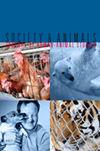Breeding, Calving, and Trafficking in Conventional Beef Production
IF 1
4区 农林科学
Q4 SOCIOLOGY
引用次数: 1
Abstract
This article uses qualitative and ethnographic methods to trace the beef production chain. An analysis of bovine artificial insemination, calving, and the trafficking of cattle as commodities reveals the various ways kinship and economic bonds are created between ranchers and cattle. These bonds are dynamic and at different times position cows as capital, calves as babies, and ranchers—both male and female—as inseminators, mothers, and traffickers of nonhuman animal bodies. Looking seriously at the ways love, connection, and kinship operate in the context of cattle production shows how animal treatment is experienced at different stages of production and by different members of the ranch family.传统牛肉生产的育种、产犊和贩运
本文采用定性和人种学方法来追踪牛肉生产链。对牛的人工授精、产犊和作为商品的牛的贩运的分析揭示了牧场主和牛之间建立亲属关系和经济联系的各种方式。这些关系是动态的,在不同的时期,奶牛被视为资本,小牛被视为婴儿,而牧场主——无论男女——则被视为授精者、母亲和非人类动物尸体的贩运者。在养牛的背景下,认真观察爱、联系和亲属关系的运作方式,可以看出在不同的生产阶段和牧场家庭的不同成员是如何经历动物待遇的。
本文章由计算机程序翻译,如有差异,请以英文原文为准。
求助全文
约1分钟内获得全文
求助全文
来源期刊

Society & Animals
社会科学-兽医学
CiteScore
1.40
自引率
12.50%
发文量
46
审稿时长
>12 weeks
期刊介绍:
Society & Animals publishes studies that describe and analyze our experiences of non-human animals from the perspective of various disciplines within both the Social Sciences (e.g., psychology, sociology, anthropology, political science) and the Humanities (e.g., history, literary criticism).
The journal specifically deals with subjects such as human-animal interactions in various settings (animal cruelty, the therapeutic uses of animals), the applied uses of animals (research, education, medicine and agriculture), the use of animals in popular culture (e.g. dog-fighting, circus, animal companion, animal research), attitudes toward animals as affected by different socializing agencies and strategies, representations of animals in literature, the history of the domestication of animals, the politics of animal welfare, and the constitution of the animal rights movement.
 求助内容:
求助内容: 应助结果提醒方式:
应助结果提醒方式:


